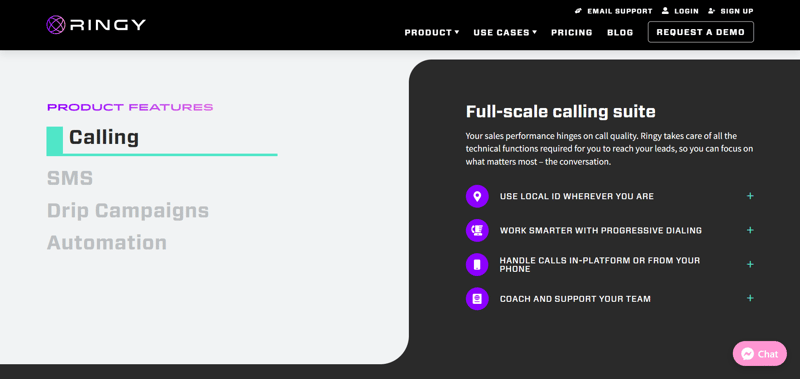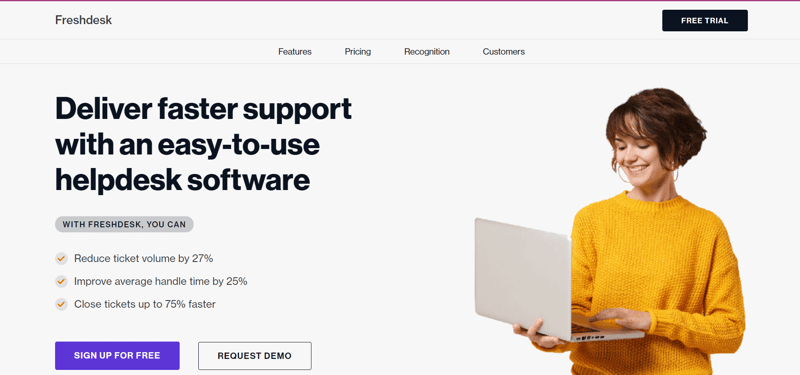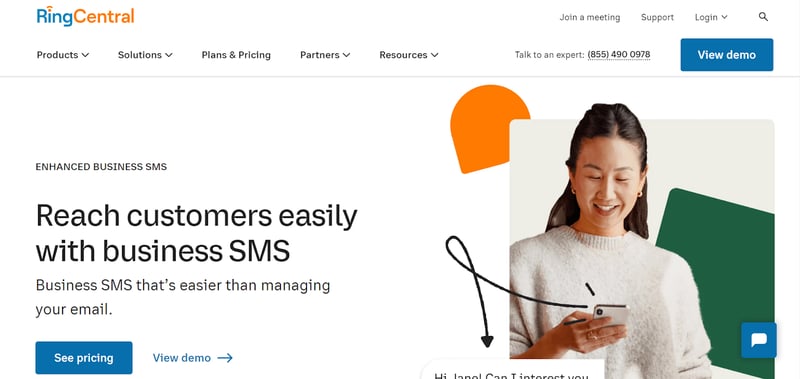
Call Center Phone Systems [Types, Automations & Recommendations]
 Updated on
Updated on
By Ringy
Table of Contents
Table of Contents
In this digital age, where every second counts and competition hangs on a hairpin trigger, staying ahead of the curve is not just a want, but an urgent necessity. Today's call center phone systems have evolved from mere telephonic conversations into sophisticated, cloud-based marvels that streamline customer interactions like never before.
Whether running a bustling call center or managing a contact center with an eye on efficiency, you've come to the right place. We're diving headfirst into the captivating world of call center telephone systems, uncovering the cutting-edge technologies, jaw-dropping automations, and cloud-based wonders that are revolutionizing the customer experience landscape.
As the business battleground gets fiercer with each passing moment, reading further is not just an option; it's the secret weapon that could unlock the gates to enhanced productivity, happier customers, and your personal call center triumph!
Ready to decode the language of call center phone systems and uncover the magic behind the scenes? Then, let's get dialed in and embark on an adventure that could change how you look at communication forever!
What Are the Different Types of Call Center Phone Systems?

Your call center phone systems come in various shapes and sizes, with each technology offering its unique advantages. We're exploring the most popular ones below to help you select the best solution for your business needs.
1. VoIP (Voice over Internet Protocol)
VoIP, short for Voice over Internet Protocol, is a call center phone system that utilizes internet connectivity to transmit voice calls. This technology converts analog audio signals into digital data packets, allowing communication over an IP network.
With VoIP, businesses can experience cost savings, enhanced scalability, and increased flexibility. In today's market, VoIP has gained significant traction due to its ability to streamline communication and reduce expenses.
A Spherical Insights & Consulting study reported that the global size of the Voice Over Internet Protocol (VoIP) market was worth USD 40.2 billion in 2022. The market is projected to expand and reach USD 108.5 billion by 2032. This indicates that VoIP has become important to the telephone system landscape.
2. SIP (Session Initiation Protocol)
SIP, or Session Initiation Protocol, is a signaling protocol used for initiating, modifying, and terminating real-time sessions involving video, voice, and other multimedia applications. It enables the establishment and management of communication sessions over IP networks. SIP-based call center phone systems offer the following abilities:
- Advanced call routing capabilities,
- Integration with various communication channels, and
- Improved collaboration features.
A recent report by Transparency Market Research revealed that the global market for SIP trunking services was valued at US$ 11.96 billion in 2021. The market is projected to grow at a CAGR of 14.1% between 2022 and 2031, leading to a substantial value increase. By 2031, the market is expected to reach an impressive US$ 43.74 billion.
A leading SIP provider is Twilio, which offers flexible SIP trunking solutions. Twilio's SIP trunking allows call centers to connect their existing private branch exchange (PBX) systems to the cloud, enabling seamless communication between on-premises and cloud-based resources.
This integration empowers call centers to scale their operations efficiently, benefiting from SIP technology's advanced features and reliability.
3. PBX (Private Branch Exchange)
PBX, or Private Branch Exchange, refers to a private telephone network used within an organization. It allows internal users to communicate with each other and also provides external communication channels, typically using analog or digital phone lines. Traditional PBX systems rely on physical hardware and are usually located on-site.
In recent years, cloud technology has introduced new variations of PBX systems, namely cloud-based PBX and hosted PBX.
Cloud-based PBX
Cloud-based PBX eliminates the need for on-premises hardware by hosting the system in the cloud. This offers numerous advantages, such as:
- Scalability,
- Flexibility, and
- Reduced maintenance costs.
Businesses can easily add or remove phone lines, access advanced features, and manage their phone system through an intuitive web interface.
Hosted PBX
Hosted PBX, virtual PBX, or hosted VoIP is a service where a third-party provider hosts the PBX system. Instead of investing in and managing their equipment, businesses subscribe to the service and remotely access the features and functionalities. Hosted PBX solutions are particularly attractive for small and medium-sized call centers that prioritize cost-effectiveness and ease of management.
8x8 is a prominent provider of hosted PBX solutions, offering a range of communication features like call recording, interactive voice response (IVR) and call analytics. Their platform enables call centers to streamline operations, improve agent productivity, and deliver superior customer service.
Types of Call Centers

Call centers come in multiple shapes and sizes, depending on their industry. We'll explore the different types of call centers below to help you make an informed decision when selecting a telephone system for your business.
1. Inbound Call Centers
Inbound call centers are the frontline warriors of customer service, focusing on handling incoming calls from customers seeking assistance, information, or support. These centers are crucial in ensuring customer satisfaction and building brand loyalty.
Roles and Responsibilities:
- Answering customer inquiries and resolving issues.
- Providing product information and guidance.
- Handling customer complaints and escalations.
- Assisting with order placement and tracking.
- Offering technical support and troubleshooting.
Examples of Use Cases:
- Customer support helplines for various industries.
- Technical support centers for software or hardware products.
- Helpdesks for service-related queries.
- Reservation and booking assistance for travel and hospitality companies.
According to a survey by Zendesk, 66% of customers prefer to reach out to companies through phone calls for issue resolution, making inbound call centers a vital channel for customer engagement.
2. Outbound Call Centers
Outbound call centers take a proactive approach by making outbound calls to customers or potential leads. These centers often engage in sales, marketing, and proactive customer outreach. Here are some key responsibilities of outbound call centers:
- Conducting sales calls and promoting products or services.
- Initiating customer follow-ups and post-purchase surveys.
- Lead generation and telemarketing activities.
- Appointment scheduling and event registrations.
- Debt collection and payment reminders.
Examples of Use Cases:
- Sales teams reaching out to prospects and nurturing leads.
- Market research companies conduct surveys over the phone.
- Non-profit organizations fundraising through outbound campaigns.
- Service providers remind customers about upcoming appointments.
3. Automated Call Centers

Automated call centers leverage technology to handle a range of customer interactions without human intervention. These centers utilize interactive voice response (IVR) systems and chatbots to automate routine tasks and provide self-service options. Here are some key points about automated call centers:
- Offering self-service options for common inquiries and transactions.
- Routing calls based on predefined criteria.
- Collecting customer data and capturing responses.
- Assisting with basic troubleshooting and FAQs.
- Providing 24/7 availability for customers.
Examples of Use Cases:
- Banking and financial institutions for balance inquiries and transaction history.
- E-commerce companies for order tracking and returns.
- Utility companies for bill payments and outage reporting.
- Airlines for automated flight information and reservation changes.
A recent study revealed that 67% of customers prefer self-service options, highlighting the growing demand for automated call centers that offer convenience and efficiency.
4. Virtual Call Centers
Virtual call centers operate with remote agents who can work from anywhere, utilizing cloud-based technologies to handle customer interactions. These centers offer flexibility and scalability while reducing infrastructure costs. Some of the roles and responsibilities of a virtual call center are:
- Handling customer inquiries via phone, chat, and email. Etc.
- Providing technical support over the phone or online.
- Assisting with order placement and tracking.
- Offering assistance with account setup and management.
- Advising customers on products and services.
Examples of Use Cases:
- Companies with geographically dispersed teams or remote workforces.
- Outsourced customer support services that operate across different time zones.
- Startups and small businesses looking for cost-effective call center solutions.
- Companies transitioning to remote work arrangements during unforeseen circumstances.
5. Omnichannel Call Centers
Omnichannel call centers provide seamless customer experiences by integrating various communication channels like phone, email, chat, social media, etc. These centers focus on delivering consistent and personalized interactions across multiple touchpoints. These are some important details about call centers equipped with omnichannel capabilities:
- Managing customer interactions across multiple channels.
- Tracking customer journeys and providing contextual support.
- Maintaining consistent information across channels.
- Enabling smooth channel switching and continuation.
- Offering a unified view of customer interactions.
Examples of Use Cases:
- E-commerce companies provide customer support via chat, email, and phone.
- Social media management companies handle customer inquiries on various platforms.
- Software companies offer support through multiple channels for their products.
- Retailers provide consistent experiences across online and in-store interactions.
6. Proactive and Reactive Call Centers
Proactive call centers initiate customer contact based on specific triggers or events, while reactive call centers handle incoming calls in response to customer-initiated interactions. Here are some important details about the differences between proactive and reactive call centers.
Proactive Call Centers:
- Conducting customer outreach campaigns.
- Notifying customers about relevant updates or promotions.
- Offering proactive support and issue resolution.
- Following up on customer feedback or surveys.
Reactive Call Centers:
- Handling customer inquiries and requests.
- Resolving complaints and issues.
- Providing support and guidance.
- Processing orders and requests.
Proactive Call Centers Use Cases
- Banks notify customers about new services or account updates.
- Airlines send flight status alerts or weather-related notifications.
- Retailers reach out to customers with personalized offers or discounts.
Reactive Call Centers Use Cases:
- Customer support helplines for various industries.
- Service providers handling customer inquiries and complaints.
- Helpdesks providing technical support and troubleshooting.
By understanding the different types of call centers and their use cases in today's market, businesses can tailor their customer communication strategies, optimize resource allocation, and deliver exceptional experiences to their valued customers.
Call Center Automation Solutions

Call center automation solutions like call center phone systems, contact center systems, and cloud-based customer service platforms are essential for building efficient and productive call centers. These tools help streamline operations, improve performance metrics, and create better customer experiences. Automation solutions provide features like:
1. Click-to-call Dialing
Click-to-call dialing is like a magic wand that bridges the gap between your digital presence and real-time customer conversations. With a simple button click, your agents can initiate outbound calls directly from their computer screens, eliminating the need for manual dialing and minimizing dialing errors.
For example, let's say you're managing an e-commerce business, and a customer has just added items to their online shopping cart but abandoned it before completing the purchase. By integrating click-to-call dialing into your call center phone system, your agents can instantly reach out to these potential customers, guiding them through the checkout process and ultimately increasing conversion rates.
2. AI SMS Chatbot
Text messaging has become an integral part of our daily lives, and leveraging AI-powered SMS chatbots can be a game-changer for your call center. These intelligent bots can handle a variety of customer queries and interactions through text messages, providing quick and accurate responses without human intervention.
Imagine a customer needing assistance with a product return. Instead of waiting on hold or navigating through a complex IVR system, they can simply text the chatbot. The bot can then gather the necessary information, validate the request, and guide the customer through the return process, all while ensuring a seamless and efficient experience.
3. Integration with CRM
Your CRM system holds valuable customer data, and integrating it with your call center phone system can unlock a whole new efficiency level. Agents can access a comprehensive customer profile in real-time by syncing customer information, purchase history, and previous interactions. Doing so enables them to provide personalized and tailored support.
For instance, imagine a customer calling your support line about a technical issue. With CRM integration, your agent can instantly access the customer's purchase history and identify previous support tickets.
Armed with this knowledge, they can address the current issue with a deeper understanding of the customer's context, leading to faster resolution and heightened customer satisfaction.
4. Automated Call Routing
Gone are the days of manually transferring calls from one department to another. Automated call routing takes the guesswork out of the equation by intelligently directing incoming calls to the most appropriate agent or department based on predefined rules or customer preferences.
Consider a scenario where a customer has a billing inquiry. Through automated call routing, the call center phone system can identify the nature of the query and automatically connect the customer to a specialized billing agent, minimizing call transfers and reducing customer frustration.
This seamless process saves time and ensures customers are connected with the right experts.
5. IVR (Interactive Voice Response)
IVR systems have become synonymous with call centers, providing a self-service option for customers while reducing the load on live agents. By leveraging voice recognition and touch-tone inputs, IVR systems allow customers to navigate menus and options to access the necessary information or support.
For example, a telecommunications company might use an IVR system to enable customers to check their account balance, request a service activation, or report a technical issue.
By efficiently handling routine inquiries, an IVR system frees up agent availability for more complex or personalized customer interactions, ensuring an optimal balance between self-service and agent-assisted support.
6. Sales and Marketing Automation
A call center phone system isn't just about customer support; it can also be a powerful tool for sales and marketing initiatives. By incorporating sales and marketing automation features, businesses can proactively engage with their customers, nurture leads, and drive revenue growth.
- SMS Campaigns: SMS campaigns enable businesses to reach a wide customer base with targeted messages, promotions, and updates. Imagine a clothing retailer launching a flash sale. With a few clicks, they can send personalized SMS messages to their customer database, instantly generating buzz and driving sales.
- Email Campaigns: Email campaigns are equally powerful, allowing businesses to deliver visually appealing newsletters, product updates, or exclusive offers directly to their customers' inboxes. These campaigns can be automated, and triggered by specific customer actions or milestones, ensuring timely and relevant communication that fosters customer loyalty and drives repeat business.
By harnessing the potential of these sales and marketing automation features, call center phone systems transform into revenue-generating machines, offering a comprehensive solution that goes beyond customer support.
3 Best Call Center Phone Systems

When choosing the best call center phone systems, three names rise above the rest like telephonic superheroes ready to save the day. Let's dive into the details of each and discover why they stand out in the crowded market of customer communication solutions.
Ringy (It's Us)

Ringy offers a comprehensive suite of features to streamline your call center operations. With our user-friendly interface and robust functionality, Ringy is quickly becoming a top choice for businesses seeking efficient and reliable call center phone systems.
Here's a closer look at what Ringy offers:
| Features |
Description |
| Intelligent Routing |
Ringy's advanced routing algorithms automatically direct calls to the most appropriate agents based on skills and availability. This ensures customers are quickly connected to the right person, reducing wait times and enhancing customer satisfaction. |
| Real-time Analytics |
Gain valuable insights into call center performance with Ringy's real-time analytics. Monitor call volumes, agent productivity, customer satisfaction, and other key metrics to make data-driven decisions and optimize your operations. |
| Call Recording and Monitoring |
Our call recording and monitoring feature allows supervisors to listen to calls, provide feedback, and identify areas for improvement. This helps maintain quality standards and train agents effectively. |
| Integration Capabilities |
Enjoy seamless integration with our CRM system, enabling you to access customer information and streamline workflows. |
| 24/7 Customer Support |
Ringy offers round-the-clock customer support to address any technical issues or inquiries that may arise. Our dedicated support team ensures smooth operations and a hassle-free experience. |
With our platform’s robust feature set, user-friendly interface, and excellent customer support, Ringy is an outstanding choice if you’re looking to elevate your call center operations. The best part is you don’t have to cough up an arm and a leg—Ringy is super affordable at only $109/month and suitable for businesses of all sizes!
Freshdesk

Freshdesk, a well-established player in the customer support arena, also offers a call center phone system that integrates seamlessly with its helpdesk software. While primarily known for its ticketing and email management capabilities, Freshdesk's call center module provides features:
| Features |
Description |
| Call Queues |
Freshdesk's call queues ensure efficient call distribution, reducing wait times and ensuring customers are attended to promptly. |
| Call Monitoring |
Supervisors can listen in on calls, coach agents in real-time, and guide them to enhance performance and customer service. |
| Reporting and Analytics |
Freshdesk's reporting and analytics feature provides insights into call volumes, agent performance, and customer satisfaction, helping managers make data-driven decisions. |
| CTI Integration |
Freshdesk seamlessly integrates with various CTI (Computer Telephony Integration) systems, allowing agents to make and receive calls directly from their helpdesk interface. |
While Freshdesk offers a solid call center phone system, it primarily caters to businesses already utilizing its helpdesk software. If you're already a Freshdesk user, integrating their call center module can be a convenient choice.
RingCentral Contact Center

RingCentral Contact Center is a feature-rich solution offering cloud-based telephony and comprehensive call center functionality. Here are some notable features:
| Features |
Description |
| Omnichannel Support |
RingCentral Contact Center supports various communication channels, including voice, email, chat, and social media, enabling customers to reach out via their preferred channel. |
| Intelligent Routing |
Calls are routed intelligently, ensuring they reach the most appropriate agents with the necessary skills and expertise. |
| Advanced IVR |
RingCentral's IVR system provides customizable call flows, personalized greetings, and self-service options, allowing callers to resolve issues without agent assistance. |
| Quality Management |
Supervisors can monitor calls, conduct quality evaluations, and provide feedback to agents for continuous improvement. |
| Real-time and Historical Reporting |
RingCentral Contact Center provides comprehensive reporting capabilities to track key call center metrics, identify trends, and make data-backed decisions. |
While RingCentral Contact Center offers a robust set of features, it is important to note that it is a comprehensive solution that may be more suitable for larger enterprises with complex communication needs.
Conclusion
Call center phone systems are invaluable for modern businesses, providing powerful and automated tools to maximize efficiency, increase ROI, and create better customer experiences.
But you must invest in the right call center phone system to capitalize on this potential. The ideal solution should meet your current needs and provide a platform for future growth and innovation.
With Ringy, you can use its intelligent routing, real-time analytics, and seamless integrations with our CRM system. These features enable efficient call distribution, personalized greetings, data-driven decision-making, and easy access to customer information, all aimed at delivering exceptional customer experiences.
Try it today and see how Ringy CRM can take your call center to the next level.

Skyrocket your sales with the CRM that does it all.
Calling? Check. SMS? Check. Automation and AI? Check. Effortlessly keep in touch with your customers and boost your revenue without limits.

Take your sales to new heights with Ringy.
Sales in a slump? Ringy gives you the tools and flexibility you need to capture leads, engage with them, and turn them into customers.
Subscribe to Our Blog
Enter your email to get the latest updates sent straight to your inbox!
Categories
Related Articles


























































